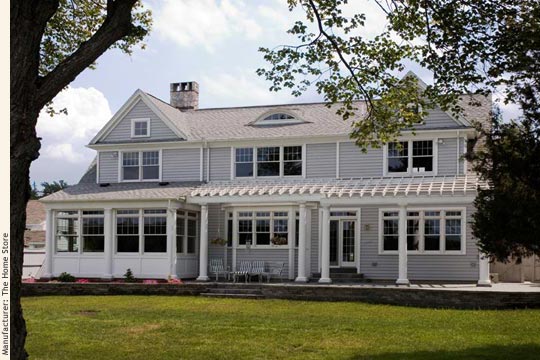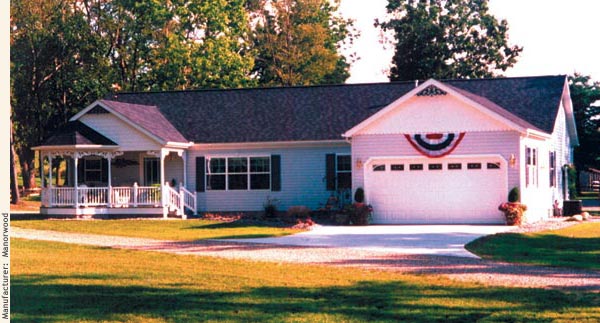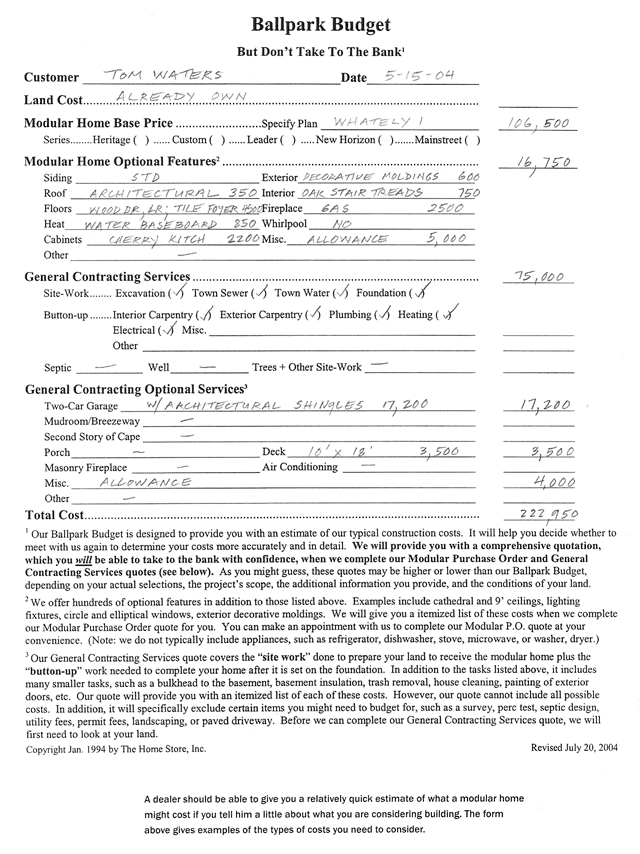 |
 |
A brief summary of Chapter 2 "Selecting a Dealer," (26 pages) in The Modular Home , by Andrew Gianino, President of The Home Store
Shopping for a modular home or for modular house plans means, first and foremost, finding a dealer who offers the kind of home you want and can back it up with good support and fair modular home prices. Many customers find this process both difficult and confusing. It is not like shopping for a new car or refrigerator. There are no consumer magazines offering comparisons and recommendations on modular home companies. Unless you know several people who have already built prefab houses and can offer advice on specific modular home companies, it may be hard to take the first step.
Part of the difficulty rests in the fact that modular home dealers (and all house builders, for that matter) offer different levels of craftsmanship and service, different materials and techniques that typical customers know little about, price variations that seem to make little sense, a variety of modular house plans, and a package of choices that can be more overwhelming than enticing.

Custom design created by architect Rob Coolidge
This chapter is addressed to customers who want to build a modular home but do not know where to start. You may or may not have a building lot, or the financing finalized, or a budget or specific modular house plans in mind, but you will need to find a dealer. In this chapter you learn what a modular home dealer's job is, or should be, and how to evaluate and compare modular home companies based upon their craftsmanship, service, price, and products. You will also get answers to the following questions about selecting a dealer:
-
How should you identify prospective modular home dealers and check their credentials?
-
Since shopping for a modular home dealer also means shopping for a modular home manufacturer, how do you evaluate the contribution of each?
-
Are you better off working with a modular housing dealer who works with several or only one or two manufacturers?
-
Are you likely to do better when a modular dealer works with a modular home manufacturer for a long time on when he shops for the best price from several modular manufacturers?
-
What is the relative importance of the services provided by the modular dealer compared to the home built by the modular manufacturer?
-
Why are most modular manufacturers determined to sell their prefab houses only to modular home dealers and never directly to retail customers like you?
-
How do you know if a dealer has the skills to help you design custom modular house plans?
-
Will a larger or smaller modular company provide you with better service?
-
Why are miscommunications and misunderstandings so common in construction projects, and how can you work with your modular dealer to minimize them?

The porch and garage hide the fact that this is a straight ranch
-
What things should you look for when checking out a modular manufacturer's homes, and how does this change when you are completing your inspection in each of the following situations: before a modular home is shipped by the factory, immediately after a modular home is set on the foundation, after a general contractor (GC) has completed a turnkey on a modular home, and after a modular home has been made into a completed display model?
-
Why should you insist on receiving elevation drawings, electrical drawings, and HVAC (heating, ventilation, and air conditioning) drawings in addition to drawings of your modular house floor plans?
-
Who should be responsible for assessing whether a prefabricated modular home can be built on your land and what work needs to be done to make this possible?
-
Should you require the modular dealer to set his own prefab houses or should you consider hiring your own crew?
While shopping for a modular home, you will be somewhat dependent on the knowledge, availability, and patience of the dealer. Consequently, you want a dealer who will take the time to educate you about your many responsibilities and who will help you carry them out.
First and foremost, you need the dealer to provide a general understanding of the projected modular home cost and schedule. He can begin at your first meeting by giving you a ballpark price. Although a ballpark price will not give you the level of detail you need to select a modular housing dealer, it will give you a reasonable idea whether you can afford to build a particular dealer and how his modular home prices compare to other dealers.

At a later meeting, the dealer should be able to give you complete itemized pricing that you can take to the bank, literally and metaphorically. To assess the likelihood that the dealer can provide this level of detail, ask to see a copy of his typical estimate. If it is one or two pages long, he is not used to providing the detail you need to protect yourself. This does not mean that he is unwilling to provide you with more detail, but you will need to ask. This chapter will help you with securing the specification and pricing details you need by answering the following questions:
-
How should you use "price per square foot"?
-
How do you go about getting a ballpark modular home price?
-
How do you go about getting a complete and detailed written estimate for your modular so you can complete an apples-for-apples comparison of your dealer candidates?
-
How do you evaluate significant price differences between modular home dealers?
A dealer's primary job is to design, price, and order a modular home from the manufacturer. The job of turning it into a livable home is that of a general contractor (GC). Most dealers also function as GCs or work closely with specific GCs, and this is a good route to follow. Acting as your own GC or working with one who does not have experience with modular homes can be risky, since you and your GC will not know the particular requirements of a modular home. Consequently, if you are intending to select an independent GC, you should ask each modular dealer to identify the specific construction tasks required to complete your home, including the plumbing and electrical hookups, heating installation, and carpentry button-up. (For more information, see chapter 5 (20 pages), " Selecting a General Contractor ," and chapter 7 (51 pages), " the General Contractor's Responsibilities ," in The Modular Home (310 pages) by Andrew Gianino.) The dealer's written information should reduce the likelihood that you and your GC will underestimate the scope of work. Should the dealer not have the knowledge to provide this information, you should ask yourself what else he does not know, and who will provide the answers to your GC's technical questions.
It will take a few meetings with each prospective dealer to learn enough about his building specifications, craftsmanship, modular home prices, and customer services. During this time, look into each dealer's background, modular experience, and company size. Begin each meeting with a plan for acquiring this information. This chapter provides a series of questions to help guide you through each interview. It also provides a series of questions to ask each customer reference provided by your modular dealers.
When you are finally ready to sign a contract with a dealer, you need to make sure that the legalese protects you as well as him. This chapter explains what needs to be included in your contract regarding deposit requirements, payment terms, prices adjustments, change orders, delays, demurrage, insurance, product changes, warranty, and contract contingencies.
For a comprehensive overview of what you need to know to build a modular home, order The Modular Home (310 pages) by Andrew Gianino.
Chapter Index
To learn more about building a modular home, read excerpts from the other chapters of The Modular Home (325 pages), by Andrew Gianino, President of The Home Store:
Chapter 4: Specifications and Features
Chapter 5: Selecting a General Contractor
Chapter 6: Finding and Preparing a Building Lot
Chapter 7: The General Contractor's Responsibilities
Chapter 8: Building a Modular Addition
Chapter 9: Financing a Modular Home
Chapter 11: Building on Schedule
|